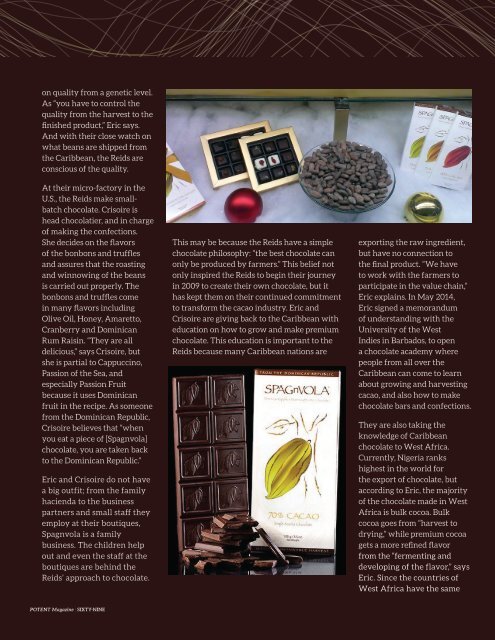POTENT Issue #2 - The Women's Issue
You also want an ePaper? Increase the reach of your titles
YUMPU automatically turns print PDFs into web optimized ePapers that Google loves.
on quality from a genetic level.<br />
As “you have to control the<br />
quality from the harvest to the<br />
finished product,” Eric says.<br />
And with their close watch on<br />
what beans are shipped from<br />
the Caribbean, the Reids are<br />
conscious of the quality.<br />
At their micro-factory in the<br />
U.S., the Reids make smallbatch<br />
chocolate. Crisoire is<br />
head chocolatier, and in charge<br />
of making the confections.<br />
She decides on the flavors<br />
of the bonbons and truffles<br />
and assures that the roasting<br />
and winnowing of the beans<br />
is carried out properly. <strong>The</strong><br />
bonbons and truffles come<br />
in many flavors including<br />
Olive Oil, Honey, Amaretto,<br />
Cranberry and Dominican<br />
Rum Raisin. “<strong>The</strong>y are all<br />
delicious,” says Crisoire, but<br />
she is partial to Cappuccino,<br />
Passion of the Sea, and<br />
especially Passion Fruit<br />
because it uses Dominican<br />
fruit in the recipe. As someone<br />
from the Dominican Republic,<br />
Crisoire believes that “when<br />
you eat a piece of [Spagnvola]<br />
chocolate, you are taken back<br />
to the Dominican Republic.”<br />
Eric and Crisoire do not have<br />
a big outfit; from the family<br />
hacienda to the business<br />
partners and small staff they<br />
employ at their boutiques,<br />
Spagnvola is a family<br />
business. <strong>The</strong> children help<br />
out and even the staff at the<br />
boutiques are behind the<br />
Reids’ approach to chocolate.<br />
This may be because the Reids have a simple<br />
chocolate philosophy: “the best chocolate can<br />
only be produced by farmers.” This belief not<br />
only inspired the Reids to begin their journey<br />
in 2009 to create their own chocolate, but it<br />
has kept them on their continued commitment<br />
to transform the cacao industry. Eric and<br />
Crisoire are giving back to the Caribbean with<br />
education on how to grow and make premium<br />
chocolate. This education is important to the<br />
Reids because many Caribbean nations are<br />
exporting the raw ingredient,<br />
but have no connection to<br />
the final product. “We have<br />
to work with the farmers to<br />
participate in the value chain,”<br />
Eric explains. In May 2014,<br />
Eric signed a memorandum<br />
of understanding with the<br />
University of the West<br />
Indies in Barbados, to open<br />
a chocolate academy where<br />
people from all over the<br />
Caribbean can come to learn<br />
about growing and harvesting<br />
cacao, and also how to make<br />
chocolate bars and confections.<br />
<strong>The</strong>y are also taking the<br />
knowledge of Caribbean<br />
chocolate to West Africa.<br />
Currently, Nigeria ranks<br />
highest in the world for<br />
the export of chocolate, but<br />
according to Eric, the majority<br />
of the chocolate made in West<br />
Africa is bulk cocoa. Bulk<br />
cocoa goes from “harvest to<br />
drying,” while premium cocoa<br />
gets a more refined flavor<br />
from the “fermenting and<br />
developing of the flavor,” says<br />
Eric. Since the countries of<br />
West Africa have the same<br />
<strong>POTENT</strong> Magazine | SIXTY-NINE



